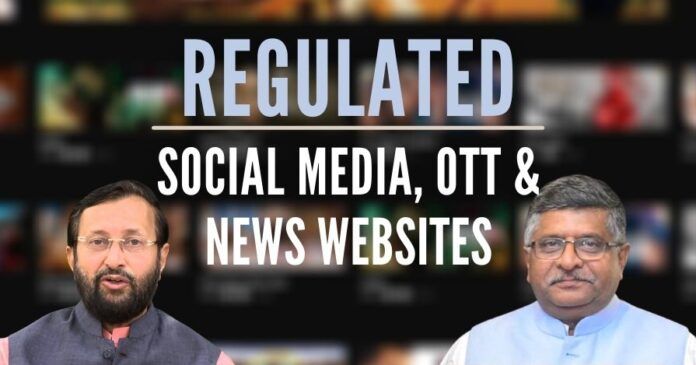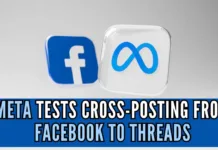
Stringent regulations by GOI for SM, OTT and News Portals
The Government of India (GOI) on Thursday announced stringent regulations for Social Media (SM) firms like Facebook and Twitter as well as OTT (over the top) players such as Netflix, requiring them to remove any content flagged by authorities within 36 hours and setting up a complaint redressal mechanism with an officer being based in the country. The guidelines will also apply to WhatsApp and Telegram kind of mobile phone apps also. The government also announced guidelines for news portals operating from India asking them to keep the rules and norms applicable to Print and TV channel codes.
The guidelines also make it mandatory for platforms such as Twitter and WhatsApp to identify the originator of a message that authorities consider to be anti-national and against the security and sovereignty of the country. The rules about digital media and OTT focus more on in-house and self-regulation mechanism whereby a robust grievance redressal mechanism has been provided while upholding journalistic and creative freedom.
IT Minister Ravi Shankar Prasad addressing media with I&B Minister Prakash Javadekar said concerns have been raised over rampant abuse of Social Media platforms and spread of fake news.
As per the guidelines, all SM, OTT platforms and news portals must have a resident Indian citizen Grievance Officer to handle the complaints and must take a decision within 15 days and monthly data of such complaints must be maintained. SM and OTT firms also must have resident Indian citizen Compliance Officer and Nodal Officer and these officers are responsible for responding to the government agencies. As far as news portals, the guidelines insist on a self-regulatory body like TV channels and overseeing mechanism in the Information Broadcasting Ministry (I&B).
I&B Minister Prakash Javadekar said publishers of news on digital media would be required to observe norms of Journalistic Conduct of the Press Council of India and the Programme Code under the Cable Television Networks Regulation Act, providing a level-playing field between the offline (print, TV) and digital media, an official statement said.
“Digital media portals have no right to spread the rumour. The media’s freedom is absolute but with reasonable restrictions. Content matter, especially media, OTT and digital media will be administered by the I&B ministry. Intermediary platforms monitoring will be done by the IT ministry (Ministry of Electronics and Information Technology) in the manner they have been doing it,” Javadekar said.
This is the first time such rules have been framed for digital and online media operating within the country’s jurisdiction. IT Minister Ravi Shankar Prasad addressing media with I&B Minister Prakash Javadekar said concerns have been raised over rampant abuse of SM platforms and spread of fake news. In a big to fix the fake ID users, the guidelines also insisted that SM platforms must verify the users through mobile phone companies.
The rules also state that users who voluntarily want to verify their accounts should be given an appropriate mechanism to do so and be accorded a visible mark of verification.
“Social Media companies are welcome to do business in India and empower Indians…We welcome criticism and dissent…But it is important that users of Social Media are given a proper forum for the resolution of their grievances in a time-bound manner,” Prasad said.
Prasad said intermediaries will fall into two categories — Social Media intermediary and significant Social Media intermediary. This distinction is based on the number of users on the SM platform, and the government will soon notify the threshold of the user base that will distinguish the two. The rules require the ‘significant’ Social Media intermediaries to follow additional due diligence including the appointment of a chief compliance officer, a nodal contact person and a resident grievance officer. All three officials will have to be citizens resident in India.
In a move that could have major ramifications for players like Twitter and WhatsApp, the government said that significant Social Media intermediaries providing services primarily in the nature of messaging will have to enable identification of the “first originator” of the information that undermines the sovereignty of India, security of the state, or public order. The intermediary, however, will not be required to disclose the contents of any message. The rules also state that users who voluntarily want to verify their accounts should be given an appropriate mechanism to do so and be accorded a visible mark of verification.
Users will have to be provided with a prior intimation and explanation when a significant Social Media intermediary removes content on its own. In such cases, users have to be provided with an adequate and reasonable opportunity to dispute the action taken by the intermediary.
Rules related to SM will be administered by the Ministry of Electronics and IT, while those related Code of Ethics and procedure and safeguards in relation to digital media will be administered by the Ministry of Information and Broadcasting. On rules related to over-the-top (OTT) and digital media, the government said, guidelines have been framed keeping in mind the difference between viewership in a theatre and television, as compared to watching it on the internet. A Code of Ethics and three-tier grievance redressal mechanism would be applicable for news publishers, OTT platforms and digital media.
- Subramanian Swamy approaches Supreme Court on Govt’s modification of 2G Scam Judgment to avoid auction of Satellite Spectrum - April 23, 2024
- Defence Minister Rajnath Singh visits Siachen. Reviews military preparedness - April 22, 2024
- Amit Shah’s shares in the Stock Market almost doubled in the past five years - April 21, 2024











[…] last US-based errant social media giants like Twitter, Facebook and Google are in hot water over their behaviour from Indian agencies. The totally defiant Twitter is now […]
[…] Sree Iyer: Thank you, sir. Reference: New norms from the GOI to regulate SM and Digital News Portals, need to furnish the first originator… […]
These are just guidelines. The SM platforms will ignore it.
They should mandate that the companies should register and have servers in India follow rules and pay Indian taxes . This should be as a new act immediately